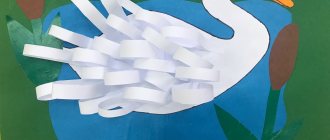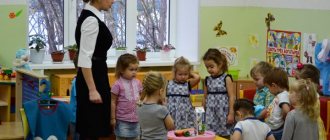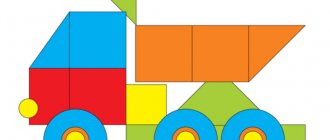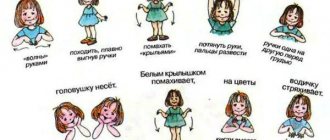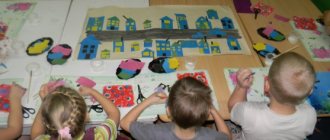Work program on valeology for grades 1-4 “Hello, children!”
Work program on valeology for grades 1-4 “Hello, children!”
primary school teacher MBOU Lyceum No. 4 of Krasnogorsk
Svetlana Iosifovna Pochtareva 2012-2013 academic year
CONTENTS
| 1. Explanatory note | 3 |
| 1.1. Introduction | 3 |
| 1.2. Goals and objectives of the program | 3 |
| 1.3. Features of the program implementation | 4 |
| 1.4. Main content of the program | 5 |
| 2. Planned results of students mastering the program | 8 |
| 2.1. Requirements for knowledge and skills that students must acquire during the implementation of the program | 9 |
| 2.2. Forms for recording knowledge and skills of the planned results of mastering the program | 10 |
| 3. Thematic course planning | 10 |
| 4. Logistics support | 14 |
| 5. List of used literature | 14 |
| 6. Test material | 16-17 |
- Explanatory note
1.1. Introduction
Modern, rapidly developing education places high demands on students and their health, thereby obliging the teacher to create conditions that promote the preservation and strengthening of health, the formation of a value-based attitude of students towards their own health and the health of others.
At the same time, health is considered as a complex, multi-level phenomenon, including physiological, psychological and social aspects. The priority of the problem of preserving and strengthening the health of students determines the need to develop students’ motivation to lead a healthy lifestyle through the organization of cultural health-preserving practices for children, through active forms of interaction, as a result of which only the formation of health-preserving competence is possible. Program on valeology (“valeo” - to be healthy, “logos” - science) “Hello, children!” compiled on the basis of the author’s program by L.A. Obukhova and N.A. Lemyaskina “School of Doctors of Nature” and includes knowledge, attitudes, personal guidelines and norms of behavior that ensure the preservation and strengthening of the physical and mental health of students and is a comprehensive program for the formation of a culture of health, promoting the cognitive and emotional development of the child, achieving the planned results of mastering the basic educational program of primary general education. Valeology program for “Hello, children!” is aimed at leveling the following school risk factors: school fears, heavy academic loads and difficulties in mastering the school curriculum, intensification of the educational process, adaptation of first-graders. The regulatory, legal and documentary basis of the program
for developing a culture of health for students at the level of primary general education is: Ø Federal Law “On Education in the Russian Federation”;
Ø Federal state educational standard for primary general education; Ø SanPiN, 2.4.2.1178-02 “Hygienic requirements for the regime of the educational process” (Order of the Ministry of Health dated November 28, 2002) section 2.9.; Ø Federal Law of March 20, 1999 No. 52-FZ “On the sanitary and epidemiological welfare of the population”, Ø Decree of the Government of the Russian Federation of March 23, 2001 No. 224 “On conducting an experiment to improve the structure and content of general education” in terms of preserving and strengthening the health of schoolchildren . Ø On the inadmissibility of overloading students in primary school (Letter of the Ministry of Defense of the Russian Federation No. 220/11-13 dated 02/20/1999); Ø Hygienic requirements for the conditions for the implementation of the basic educational program of primary general education (2009); 1.2. The purpose and objectives of the program
The program on valeology “Hello, children!”
can be considered as one of the steps towards the formation of a culture of health and an integral part of the entire educational process at school. The main idea of the program is to motivate students to lead a healthy lifestyle, to develop the need to maintain physical and mental health as a necessary condition for a person’s social well-being and success. This program is educational in nature and is aimed at the formation, preservation and strengthening of the health of primary schoolchildren. It is based on cultural and personality-oriented approaches. The content of the program reveals the mechanisms for developing the value of health in students at the stage of primary general education and is aimed at achieving the following goal
: Ø developing motivation for health conservation and behavioral skills for a healthy lifestyle in primary schoolchildren.
The goal is specified by the following tasks : To form
a child’s recognition of the value of health, a sense of responsibility for preserving and strengthening his health;
o children’s ideas about factors that influence health (both positive and negative); o motor motivation of the child, optimize it; o the need for children to fearlessly consult a doctor regarding health issues, including those related to growth and development. Teach
o conscious choice of behavior that allows you to maintain and improve health;
o rules of personal hygiene, readiness to independently maintain one’s health; simple relaxation skills; Goals and objectives of the valeological program “Hello, children!” comply with Federal State Educational Standards; the goals and objectives of the main educational program of the NOU, and the Subprogram “Lyceum – School of Health”, implemented at the Municipal Budgetary Educational Institution Lyceum No. 4 in Krasnogorsk. 1.3. Features of the program implementation
Program in valeology “Hello, children!”
intended for use by class teachers in educational work during class hours and by teachers in extracurricular activities for students in grades 1-4. Classes are held outside of school hours, the duration of the lesson is 35 minutes (in accordance with SanPiN). Classes are held in a classroom assigned to the classroom, if necessary - in the dining room or in a specially equipped classroom, or in the fresh air - depending on the topic of the lesson. Valeological program “Hello, children!” is intended for students in grades 1-4 aged 6 to 11 years and is designed for 4 years in the amount of 135 lessons, 1 hour per week: grade 1 - 33 hours per year, grades 2-4 - 34 hours per year. The implementation of this program within the framework of extracurricular activities corresponds to the maximum permissible workload of primary school students. The health-saving organization of the educational process is designed to use forms and methods of teaching that are adequate to the age capabilities of a primary school student: conversations, recreational minutes, business games (“ambulance”, “doctor of nature” , “questions and answers”), a set of exercises, communication with nature, etc.; includes extensive fairy tale material. 1.4. Main content of the program
Program on valeology “Hello, children!”
consists of four parts: Ø 1st grade “First steps to health” Ø 2nd grade “If you want to be healthy” Ø 3rd grade “On the paths of health Ø 4th grade “I, you, he, she - we are a healthy family” 1st grade “First steps to health" Goal:
initial acquaintance with a healthy lifestyle, formation of the need for personal hygiene, familiarization with vitamins and products containing them.
Category of students:
1st grade students
Duration of training:
1 year
Class schedule
: 1 hour per week, 33 hours per year
| 1 class . Main content. | Number of hours |
| 1. Be friends with water. 2. Taking care of your eyes. 3. Ear care. 4.Dental care. 5. Hand and foot care. 6. Skin care. 7. How to eat. 8. How to make sleep useful. 9. The mood at school. 10.Mood after school. 11. Behavior at school. 12. Bad habits. 13.Muscles, bones and joints. 14. How to harden yourself. Rubbing and dousing. 15.How to behave correctly on the water. 16. School of Young Olympians 17. Outdoor games 18. Generalization | 2h. 1 hour 1 hour 3h. 1 hour 3h. 2h. 1 hour 1 hour 1 hour 2h. 2h. 2h. 1 hour 1 hour 2h. 2h. 2h. |
Grade 2 “If you want to be healthy” Goal:
nutritional culture and etiquette, the concept of immunity, hardening procedures, familiarization with medicinal and poisonous plants of our region.
Category of students:
2nd grade students
Duration of training:
1 year
Class schedule
: 1 hour per week (34 hours)
| 2nd grade. Main content. | Number of hours | |
| 1. Why do we get sick? 2. Who and how protects us from diseases. 3. Who treats us. 4.Vaccinations against diseases. 5. What you need to know about medications. 6. How to avoid poisoning. 7. Safety in any weather. 8. Rules for safe behavior in the house, on the street, in transport. 9. Rules for safe behavior on water. 10. Rules for handling fire. 11. How to protect yourself from electric shock. 12. How to protect yourself from cuts, bruises, and fractures. 13. How to protect yourself from insects. 14. Precautions when handling animals. 15. First aid for poisoning. 16. First aid for overheating and heat stroke, burns and frostbite. 17. First aid for injuries. 18.First aid for foreign bodies in the eyes, ears, nose. 19. First aid for bites 20. Today's medical concerns | 3h. 2h. 1 hour 2h. 2h. 2h. 2h. 2h. 1 hour 1 hour 1 hour 1 hour 1 hour 1 hour 2h. 2h. 3h. 1 hour 1 hour 3h. |
Grade 3 “On the paths of health” Purpose:
intellectual abilities, personal hygiene and health, the concept of microbes, bad habits and their prevention, the use of medicinal plants for preventive purposes.
Category of students:
3rd grade students (34 hours).
Duration of training
: 1 year
Class schedule:
1 hour per week
| 3rd grade. Main content. | Number of hours |
| 1. What you shouldn’t be afraid of 2. It’s more pleasant to be kind than to be angry, envious and greedy 3. Why do we tell lies 4. Why don’t we obey our parents? 5. You must be able to restrain yourself 6. Bad habits 7. How to treat gifts 8. How to treat punishments 9. How to dress 10. How to behave with strangers 11. How to behave when something hurts 12. How behave at the table 13. How to behave at a party 14. How to behave in public places 15. “Bad words.” “Bad jokes” 16. What to do if you don’t want to go to school 17. What to do after school 18. How to choose friends 19. How to help parents 20. Hurry to do good 21. Repetition | 1 hour 2h. 2h. 2h. 2h. 2h. 2h. 1 hour 1 hour 1 hour 1 hour 2h. 1 hour 2h. 2h. 1 hour 1 hour 2h. 1 hour 2h. 3h. |
4th grade “I, you, he, she - we are a healthy family” Goal:
developing a sense of responsibility for one’s health, fashion and hygiene of school clothes, prevention of bad habits, culture of emotions and feelings.
Category of students
: 4th grade students
Duration of study
: 1 year Class schedule: 1 hour per week
| 4th grade. Main content. | Number of hours |
| 1. Our health 2. How to help maintain your health 3. What depends on my decision? 4. The evil wizard tobacco 5. Why some habits are called bad 6. Help yourself 7. The evil wizard alcohol 8. The evil wizard drugs 9. We are one family 10. My diet 11. Cleanliness and health 12. School of young Olympians 13. Generalization | 4h. 3h. 2h. 1 hour 5h. 1 hour 3h. 2h. 2h. 2h. 2h. 5h. 1 hour |
2. Planned results of students mastering the program
In the process of training and education, children develop their own attitudes, needs, motivation to comply with the norms and rules of a healthy lifestyle, a culture of health.
Students
develop cognitive, personal, regulatory, communicative universal learning actions.
Personal results
of the valeology program “Hello, children!”
is the formation of the following skills: Ø Determine and express, under the guidance of a teacher, the simplest and most common rules of behavior for all people in cooperation (ethical standards); Ø In situations of communication and cooperation proposed by the teacher, based on simple rules of behavior common to everyone, make a choice,
with the support of other group members and the teacher, what to do.
Ø Develop a responsible attitude towards your own health and the health of others. The meta-subject results
of the program are the formation of the following universal learning activities (ULAs):
1. Regulatory LEAs:
Ø
Determine and formulate
the purpose of the activity in the lesson with the help of the teacher.
Ø Prescribe
the sequence of actions during the lesson.
Ø Learn to express
your assumption (version) based on working with an illustration, learn
to work
according to the plan proposed by the teacher.
Ø Learn, together with the teacher and other students, to give an emotional assessment
of the class’s activities in the lesson.
Ø Develop abilities for self-analysis, self-knowledge, skills of conducting positive internal dialogue about oneself; 2. Cognitive UUD:
Ø Make a preliminary selection of sources of information:
navigate
in the textbook (on the double page, in the table of contents, in the dictionary).
Ø Gain new knowledge: find answers
to questions using the textbook, your life experience and information received in class.
Ø Process the information received: draw
conclusions as a result of joint work of the whole class.
Ø Convert information from one form to another: compose stories based on the simplest models (subject models, drawings, schematic drawings, diagrams); find and formulate a solution to a problem using simple models (object models, drawings, schematic drawings). Ø Will be able to use knowledge about the structure and functioning of the human body to maintain and strengthen their health. 3. Communicative UUD :
Ø The ability to convey one’s position to others: to formalize one’s thoughts in oral and written speech (at the level of one sentence or a short text).
Ø Listen
and
understand
the speech of others.
Ø The means of forming these actions is the technology of problem dialogue (inducing and leading dialogue). Ø Jointly agree on the rules of communication and behavior at school and follow them; learn tolerant relationships in the class team. Ø Learn to perform different roles in a group (leader, performer, critic). Ø Learn to adapt and self-realize your creative abilities in society. Ø Learn to perceive the world around you positively. 2.1. Requirements for the knowledge and skills that students must acquire during the implementation of the program
As a result of the implementation of the valeological program “Hello, children!”
students should know
: Ø basic hygiene issues;
Ø features of the influence of bad habits on the health of a primary school student; Ø features of the impact of physical activity on the human body; the importance of physical exercise for maintaining and promoting health; Ø basics of rational nutrition; knowledge about “healthy” and “harmful” foods, the importance of diet. Ø first aid rules; Ø ways to preserve and improve health; Ø follow generally accepted rules in the family, at school, when visiting, in transport, in public institutions; Ø the influence of health on successful educational activities; be able to:
Ø create an individual daily routine and follow it;
Ø perform physical exercises to develop physical skills; Ø distinguish between “healthy” and “harmful” products; Ø use means of preventing acute respiratory infections, acute respiratory viral infections; Ø identify favorable factors affecting health; take care of your health; Ø use basic research skills in your work; Ø provide first aid for bleeding, suffocation, drowning, frostbite, burns, injuries, heat and sunstroke; Ø find a way out of stressful situations; Ø make reasonable decisions regarding personal health and maintaining and improving a safe and healthy living environment; Ø adequately assess your behavior in life situations; be responsible for your actions; Ø defend your moral position in a situation of choice. 2.2. Forms for recording the knowledge and skills of the planned results of mastering the program
Program in valeology “Hello, children!”
involves training at two main levels: the first is informative, which consists of studying the rules and patterns of a healthy lifestyle; the second is behavioral, allowing you to consolidate socially approved behavior patterns. A socially approved model of behavior can be developed only as a result of involving students in health-saving practices. The most rational way is to summarize each section being studied in a game form: quizzes, creative competitions, KVNs, role-playing games, etc. Taking into account knowledge and skills for monitoring and evaluating the results of mastering the program can occur by archiving the creative works of students and accumulating materials of the “ portfolio
” type.
3. Thematic planning of the course Category of students
: students of grades 1-4
Duration of study
: 4 years, 135 hours
Class schedule:
1 hour per week
| Lesson number, week | Topic of the lesson | Note |
| 1 class | ||
| Make friends with water | ||
| 1 | Doctor Water's advice | |
| 2 | Friends Water and Soap | |
| Taking care of your eyes | ||
| 3 | Eyes are the main assistants of a person | |
| Ear care | ||
| 4 | For ears to hear | |
| Dental care | ||
| 5 | Why do my teeth hurt? | |
| 6 | To keep your teeth healthy | |
| 7 | How to keep your smile healthy | |
| Hand and foot care | ||
| 8 | Human "working tools" | |
| Skin care | ||
| 9 | Why does a person need skin? | |
| 10 | Reliable body protection | |
| 11 | If the skin is damaged | |
| How to eat | ||
| 12 | Nutrition is a necessary condition for human life | |
| 13 | Healthy food for the whole family | |
| How to make your sleep healthy | ||
| 14 | Sleep is the best medicine | |
| School mood | ||
| 15 | How are you? | |
| Mood after school | ||
| 16 | I came from school | |
| Behavior at school | ||
| 17-18 | I am a pupil | |
| Bad habits | ||
| 19-20 | Bad habits | |
| Muscles, bones and joints | ||
| 21 | The skeleton is our support | |
| 22 | Posture – slender back! | |
| How to harden yourself. Rubbing and dousing | ||
| 23 | If you want to be healthy | |
| How to behave correctly on the water | ||
| 24 | Water safety rules | |
| School of Young Olympians | ||
| 25-29 | In the land of the Olympians | |
| Outdoor games | ||
| 30-31 | Russian folk games | |
| 32-33 | Doctors of Nature (General) | |
| 2nd grade | ||
| Why do we get sick | ||
| 1 | Cause of illness | |
| 2 | Signs of illness | |
| 3 | How is your health? | |
| Who protects us from illness and how? | ||
| 4 | How does the body help itself? | |
| 5 | Healthy lifestyle | |
| Who is treating us | ||
| 6 | What kind of doctors are treating us? | |
| Vaccinations against diseases | ||
| 7 | Infectious diseases | |
| 8 | Vaccinations against diseases | |
| What you need to know about medications | ||
| 9 | What medications do we choose? | |
| 10 | Home first aid kit | |
| How to avoid poisoning | ||
| 11 | Drug poisoning | |
| 12 | Food poisoning | |
| Safety in any weather | ||
| 13 | If it's sunny and hot | |
| 14 | If it's raining and thunderstorm outside | |
| Rules for safe behavior in the house, on the street, in transport | ||
| 15 | Danger in our home | |
| 16 | How to behave on the street | |
| Rules for safe behavior on the water | ||
| 17 | Water is our friend | |
| Rules for dealing with fire | ||
| 18 | So that the fire does not cause harm | |
| How to protect yourself from electric shock | ||
| 19 | How dangerous is electric current? | |
| How to protect yourself from cuts, bruises, and fractures | ||
| 20 | Injury | |
| How to protect yourself from insects | ||
| 21 | Insect bites | |
| Precautions when interacting with animals | ||
| 22 | What do we know about dogs and cats | |
| First aid for poisoning | ||
| 23 | Poisoning with toxic substances | |
| 24 | Carbon monoxide poisoning | |
| First aid for overheating and heatstroke, burns and frostbite | ||
| 25 | How to help yourself with heatstroke | |
| 26 | If you get frostbite | |
| First aid for injuries | ||
| 27 | Sprained ligaments and dislocated bones | |
| 28 | Fractures | |
| 29 | If you get hurt or cut | |
| First aid for foreign bodies in the eye, ear, nose | ||
| 30 | If a foreign object gets into your eye, ear, nose, or throat | |
| First aid for bites | ||
| 31 | Snake bite | |
| Today's medical concerns | ||
| 32 | Grow healthy | |
| 33 | Educate yourself | |
| 34 | I choose to move | |
| 3rd grade | ||
| What not to be afraid of | ||
| 1 | How to cultivate confidence and fearlessness? | |
| It is more pleasant to be kind than to be angry, envious and greedy | ||
| 2 | Learning to think | |
| 3 | Hurry to do good | |
| Why do we tell lies | ||
| 4 | Will deception help us? | |
| 5 | “Untrue-lies” in proverbs and sayings | |
| Why don't we obey our parents? | ||
| 6 | Should you listen to your parents' advice? | |
| 7 | Why do children and parents not always understand each other? | |
| You have to be able to restrain yourself | ||
| 8 | Are all wishes fulfilled? | |
| 9 | How to cultivate restraint | |
| Bad habits | ||
| 10-11 | How to wean yourself from bad habits | |
| How to treat gifts | ||
| 12 | I accept the gift | |
| 13 | I give gifts | |
| How to deal with punishment | ||
| 14 | Punishment | |
| How to dress | ||
| 15 | Cloth | |
| How to behave with strangers | ||
| 16 | Responsible Behavior | |
| How to behave when something hurts | ||
| 17 | Pain | |
| How to behave at the table | ||
| 18 | Table setting | |
| 19 | Table manners | |
| How to behave when visiting | ||
| 20 | Are you going to visit | |
| How to behave in public places | ||
| 21 | How to behave in transport and on the street | |
| 22 | How to behave in the theater, cinema, school | |
| "Bad words." "Bad jokes" | ||
| 23 | Can we communicate politely? | |
| 24 | Can we talk on the phone? | |
| What to do if you don't want to go to school | ||
| 25 | help yourself | |
| What to do after school | ||
| 26 | Know how to organize your leisure time | |
| How to choose friends | ||
| 27 | What is friendship | |
| 28 | Who can be considered a true friend | |
| How to help parents | ||
| 29 | How to make your parents happy | |
| Hurry to do good | ||
| 30 | If anyone needs your help | |
| 31 | How to help the sick and helpless | |
| School of Young Olympians | ||
| 32-34 | In the land of the Olympians | |
| 4th grade | ||
| Our health | ||
| 1 | What is health? | |
| 2 | What are emotions? | |
| 3 | Feelings and actions | |
| 4 | Stress | |
| How to help keep yourself healthy | ||
| 5 | Learning to think and act | |
| 6 | Learning to find the cause and consequences of events | |
| 7 | Know how to choose | |
| What depends on my decision? | ||
| 8 | I make a decision | |
| 9 | I am responsible for my decision | |
| Evil wizard tobacco | ||
| 10 | What do we know about smoking | |
| Why are some habits called bad? | ||
| 11 | Addiction | |
| 12 | Know how to say NO | |
| 13 | How to say NO | |
| 14 | Why would you say no to a bad habit? | |
| 15 | I know how to choose - safe behavior training | |
| help yourself | ||
| 16 | Volitional behavior | |
| Evil wizard alcohol | ||
| 17 | Alcohol | |
| 18 | Alcohol is a mistake | |
| 19 | Alcohol – make a choice | |
| Evil wizard drug | ||
| 20 | Drug | |
| 21 | Drugs – safe behavior training | |
| We are a family | ||
| 22 | Boys and girls | |
| 23 | My family | |
| 24 | Friendship | |
| My food | ||
| 25 | Do we know how to eat properly? | |
| 26 | I choose porridge | |
| Cleanliness and health | ||
| 27 | Cleanliness and tidiness | |
| 28 | Where do dirt come from? (travel game) | |
| School of Young Olympians | ||
| 29-33 | In the land of the Olympians | |
| 34 | Generalization. Lesson-KVN “Our Health” | |
Logistics:
1. Teaching aids: natural aids; visual visual aids (drawings, schematic drawings, charts, tables): paintings by Russian artists; posters: “My body”, “Brushing our teeth correctly”, “Set of morning exercises”, “Correct posture”, “Gymnastics for the eyes”, etc.; measuring instruments: scales, watches and their models. 2. Equipment for demonstrating multimedia presentations: computer, multimedia projector, DVD, etc.
List of used literature
1. Valeology.
Textbook Manual / ed. prof. V.P. Solomina, Yu.L. Varlamova. St. Petersburg, 2005 2. Derekleeva N.I. Motor games, training and health lessons. 1-5 grades. – M.VAKO, 2004 3. Zaitsev G.K. Your first health lessons. 2005 4. Zaitsev G.K. Lessons from Moidodyr. St. Petersburg, 2006 5. Zaitsev G.K. Lessons from Aibolit. St. Petersburg, 2007 6. Zaitsev G.K., Zaitsev A.G. Your health: strengthening the body. St. Petersburg, 2008 7. Zaitsev G.K. School valeology; scientific justification and software, St. Petersburg, 2007 8. Lazarev M.L. Hello: program for developing the health of preschool children. M., 2007 9. Laptev A.K. Secrets of the health pyramid: textbook. manual on valeology for elementary school. St. Petersburg, 2008 10. Latokhina L.I. We create health of soul and body. St. Petersburg, 2007 11. Nikolaeva A.P., Kolesov D.V. Drug addiction prevention lessons at school. 2003 12. Obukhova L.A., Lemyaskina N.A. School of Doctors of Nature or 135 health lessons: grades 1-4. M.: VAKO, 2004 13. A dazzling smile for life: a manual on oral hygiene for elementary school / ed. G.M. Koroleva, M.: 2006 14. Travels of Juneau. Adventures in the land of “Health”: textbook. for 2nd grade / K.A. Parms, L.R. Lieberman, K.V. Crown. M., 2003 15. Sizanova A.I. etc. Safe and responsible behavior: a series of conversations, practical and training sessions with students in grades 1-9 about HIV infection and drug addiction; edited by A.I. Sizanova, Mn. 2008 16. Sokovnya-Semenova N.N. Fundamentals of a healthy lifestyle and first medical aid: textbook. manual for students of secondary pedagogical institutions, 2nd ed.; stereotypical. M., 2007 17. Tatarnikova L.G., Zakharevich N.B., Kalinina T.N. Valeology. Basics of child safety. A manual for the course valeology “Me and my health for first-level school. St. Petersburg, 2007 18. Uruntaeva G.A., Afonkina Yu.A. How I grow: advice from a psychologist to parents. M., 2006 19. Physical education for the whole family / comp. T.V. Kozlova, T.A. Ryabukhin. M., 2009 APPENDIX Test “Are you eating right?” 1. How often do you eat during the day?
a) Three times a day.
b) Twice. c) Once. 2. Do you always have breakfast?
a) Always.
b) Not always. c) Never. 3. What does your breakfast consist of?
a) Porridge and tea.
b) Meat dish and tea. c) Tea. 4. Do you often snack between breakfast and lunch, lunch and dinner?
a) Never.
b) Once or twice a day. c) Three times or more. 5. How often do you eat vegetables, fruits, salads?
a) Three times a day.
b) Once or twice a day. c) Two to three times a week. 6. How often do you eat fried food?
a) Once a week.
b) Three to four times a week. c) Every day. 7. How often do you eat baked goods?
a) Once a week.
b) Three to four times a week. c) Every day. 8. What do you spread on bread?
a) Margarine.
b) Butter with margarine. c) Only oil. 9. How many times a week do you eat fish?
a) Three or four times.
b) Once or twice. c) Once and less often. 10. How often do you eat baked goods?
a) Less than three times a week.
b) From 3 to 6 times a week. c) At every meal. 11. How many cups of tea or coffee do you drink per day?
a) One or two.
b) From three to five. c) Six or more. 12. Before you start eating a meat dish, you need to:
a) remove all fat from the meat;
b) remove some of the fat; c) leave all the fat. Key: a
- 2 points,
b
-1 point,
c
- 0 points.
Calculate the total points. If you scored: 0-13 points
- be careful, there is a health hazard;
14 -17 points
- nutrition needs to be improved;
18 - 24 points
- excellent diet and quality of nutrition
Diagnostics “What do we know about health”
1. What is special sensitivity to certain substances called?
a) infection b) epidemic c) allergy
2. How are intestinal diseases not transmitted?
a) by air b) with food c) with dirty hands
3. What is harmful to health?
a) outdoor games b) sedentary lifestyle c) swimming, skiing
4. What is not harmful to health?
a) smoking b) hardening c) alcohol
5. How are pathogens of infectious diseases transmitted?
a) by air b) with food c) with water
6. Which disease is not infectious?
a) influenza b) dysentery c) chickenpox
7. What substance destroys the body and ultimately kills a person?
a) nicotine b) alcohol c) drugs
8. What will not help the body become stronger?
a) playing sports b) hardening c) delicious food
9. What food cannot be called healthy?
a) regular b) without haste c) monotonous
Interpretation (
1 point -1 correct answer)
8-9 points
- you are well aware of health
5-6 points
- you need to think about your health
Less than 5
- your health is in danger.
